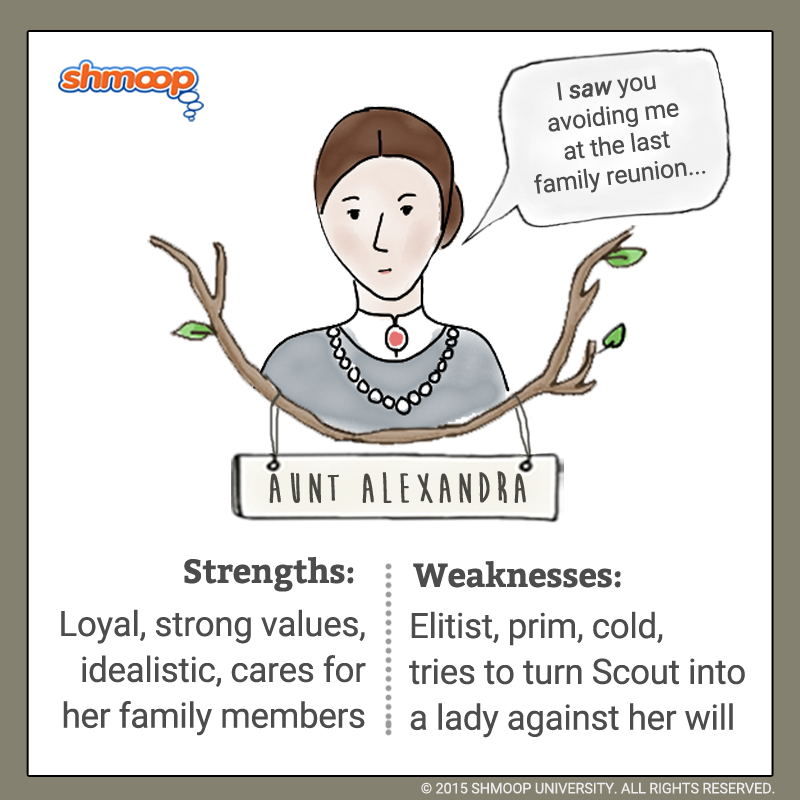Character Analysis
Aunt Alexandra is so different from her easy-going brothers Atticus and Jack that Scout wonders if she was switched at birth with another family's baby. She's kind of woman who wears a corset even under her bathrobe. (You know the type. Right? Okay, anyway.) Scout compares her to Mount Everest: "throughout my early life, she was cold and there" (9.36). And whenever Scout expresses a desire to do something Aunty believes is Not Done By Finches, she's down on her niece like an avalanche.
She had said Indeed Not, but this time she would give her reasons: "But I want to play with Walter, Aunty, why can't I?"
She took off her glasses and stared at me. "I'll tell you why," she said. "Because—he—is—trash, that's why you can't play with him. I'll not have you around him, picking up his habits and learning Lord-knows-what." (23.86-87)
Aunty sees the Finch name like an exclusive brand: it's valuable when you can only find it at Bloomingdale's, but make it available at Wal-Mart and it'll seem cheap. Aunt Alexandra's obsession with "What Is Best For the Family" (13.22)—in Scout's ears, Aunty often speaks in Capital Letters Of Doom—is part of her more general way of classifying people by family heritage.
Aunt Alexandra, in underlining the moral of young Sam Merriweather's suicide, said it was caused by a morbid streak in the family. Let a sixteen-year-old girl giggle in the choir and Aunty would say, "It just goes to show you, all the Penfield women are flighty." Everybody in Maycomb, it seemed, had a Streak: a Drinking Streak, a Gambling Streak, a Mean Streak, a Funny Streak. (13.26)
Her obsession with Family Streaks suggests an underlying belief that Family is Destiny—and that Finches are Destined to be Superior. But she uses that Destiny as a metaphorical club to beat Scout into line with. The Finch Grand Destiny apparently only holds true so long as Finch family members Live Up To It, and Scout's lack of concern for the Dignity of her Heritage could damage the Family Standing. (Looks like Capital Letters Of Doom are Contagious.)

(Click the character infographic to download.)
Lady or the Tramp
Besides instilling the Finch kids with a sense of their own importance, Aunt Alexandra's other mission is to make sure Scout grows up into a nice young lady. She sets to work trying to quash Scout's tomboyish tendencies and to prepare her for a life of docile domesticity:
Aunt Alexandra was fanatical on the subject of my attire. I could not possibly hope to be a lady if I wore breeches; when I said I could do nothing in a dress, she said I wasn't supposed to be doing things that required pants. Aunt Alexandra's vision of my deportment involved playing with small stoves, tea sets, and wearing the Add-A-Pearl necklace she gave me when I was born; furthermore, I should be a ray of sunshine in my father's lonely life. (9.74)
Scout, however, would much rather get dirty, swear, and shoot her air rifle with her older brother Jem. At the same time, she's strangely fascinated by her aunt's mysterious world of ladies' tea parties, which seem to operate according to an entirely different set of rules. At the tea party where Miss Maudie takes down Mrs. Merriweather for talking smack about the Robinson case, one moment in particular mystifies Scout:
When she had them well on the road with Mrs. Perkins, Aunt Alexandra stepped back. She gave Miss Maudie a look of pure gratitude, and I wondered at the world of women. Miss Maudie and Aunt Alexandra had never been especially close, and here was Aunty silently thanking her for something. For what, I knew not. I was content to learn that Aunt Alexandra could be pierced sufficiently to feel gratitude for help given. (24.53)
It's unclear whether recent experiences have caused Aunt Alexandra to thaw slightly, or if it's Scout who has started seeing her more clearly. In any case, it seems Aunt Alexandra's direct lessons to Scout on How To Be A Lady are less effective than those fleeting moments when Aunt Alexandra demonstrates by example what being a lady means.
Ironically, Aunt Alexandra's concern for Family causes her to go head to head with her brother Atticus, whose defense of Tom Robinson, Aunt Alexandra thinks, might endanger the Finch reputation. In the end, however, family affection that looms largest for Aunt Alexandra. After Tom is shot trying to escape, Alexandra tells Miss Maudie, "I can't say I approve of everything he does, Maudie, but he's my brother, and I just want to know when this will ever end. […] It tears him to pieces" (24.76).
While Aunt Alexandra is the voice of a particular kind of family values throughout the novel, she also stands by her family when they need her—though we can't quite tell whether that's because of her values or in spite of them.